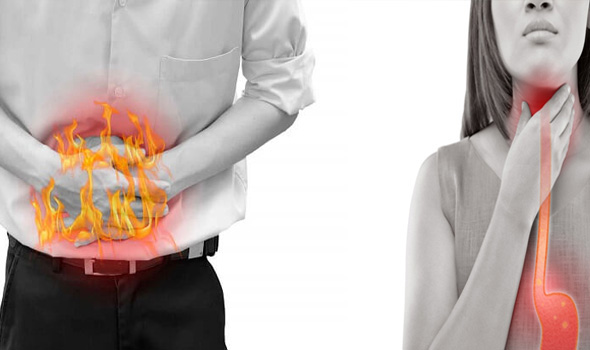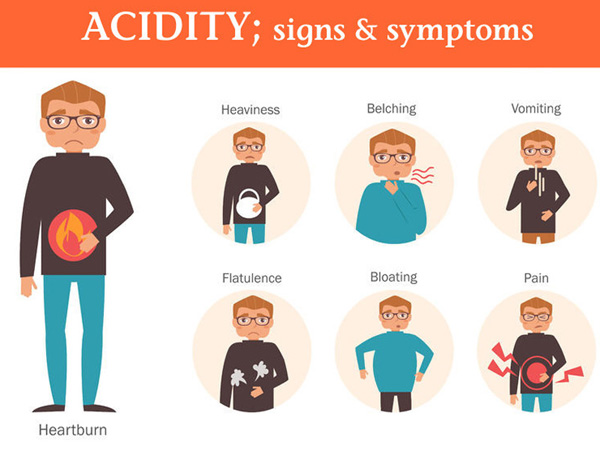Introduction
The food we eat goes into our stomach through the oesophagus. The gastric glands in your stomach create acid, which is necessary to digest the food. When the gastric glands create more acid than needed for the digestion process, you tend to feel a burning sensation below the breastbone. This condition is commonly called acidity. Oesophagus damage: Oesophagus is the food pipe that connects your mouth to your stomach. When acid moves back up and enters the oesophagus, it sets the stage for esophageal ulcers, oesophagitis, esophageal strictures, and Barrett’s Oesophagus.

Causes of Hyperacidity
Acidity is caused due to excess production of acid in the stomach by the gastric glands. Factors that cause acidity include:
- Unhealthy eating habits
- Skipping meals or eating at irregular times
- Eating just before sleeping
- Overeating
- Consumption of spicy food
- High intake of table salt
- Diet low in dietary fibre
- Excessive consumption of certain food
- Drinks such as tea, coffee, carbonated drinks, soft drinks
- Extremely spicy food
- Fat rich food such as pizza, doughnuts, and fried food
- Side-effects of certain temporary medications as well as existing medications
- It includes medications such as
- Non-steroidal anti-inflammatory drugs ( Pain-Killers)
- Medicines for high blood pressure
- Antibiotics
- Depression and anxiety medications
- Stomach disorders such as gastroesophageal reflux disease, tumours, and peptic ulcers, among others
- Other causes include
- Consumption of non-vegetarian food
- Excessive stress
- Lack of sleep
- Frequent smoking
- Lack of physical exercise
- Frequent consumption of alcohol

Symptoms of Hyperacidity
Acidity symptoms include the following:
- Burning sensation and pain in the stomach
- Burning sensation and pain in the throat
- Difficulty swallowing or the sensation of food being stuck in your throat
- Frequent burping or hiccups for no apparent reason
- Burning sensation and pain in the chest
- Regurgitation: Prolonged sour taste in the mouth or bitter-tasting acid that backs up into your throat and mouth
- Post-meal heaviness
- Nausea
- Constipation
- Indigestion
- Bad breath
- Restlessness
Hyperacidity symptoms include:
- Heartburn: Persistent pain or discomfort that moves from your stomach to your chest and sometimes even up to your throat.
- Chronic discomfort in the upper abdomen
- Bloody or black stool often accompanied by bloody vomiting
- Wheezing, dry cough, hoarseness, or chronic sore throat
- Weight loss for no apparent reason

Homoeopathy and Acidity
- NUX Vomica
- Is an excellent remedy for gastric derangements.
- There is loss of appetite, pain after eating.
- Indigestion is the ranking symptom of this remedy.
- It has pains radiating to various directions from the epigastrium with spasmodic vomiting.
- Nervous gastralgia.
- The discomfort comes about half an hour after meals. When due to spirituous liquors.
- This patient was worse in the morning.
- Carbo Veg
- Slow and imperfect digestion, weight in the stomach and intestines and a faint and all-gone sensation in the stomach not relieved by eating.
- a few mouthfuls there is a sense of repletion.
- There is violent burning in the stomach, chest and abdomen with crampy pains which force the patient to bend double.
- Heaviness in the stomach.
- The eructations are rancid.
- Sour and putrid.
- There is flatulence in the stomach or upper part of the abdomen.
- Desire to eat spicy food, alcohol, smoking.
- Cinchona
- Where there is flatulence in the whole of abdomen and the distension is painful ,
- Pain relieved momentarily by belching.
- Sour or bitter eructation or offensive flatus.
- Digestion is slow, and worse after late supper.
- Yellow diarrhoea, worse at night and after meals is an important keynote of this remedy.
- Lycopodium
- It is indicated when there is flatulence in the lower part of the abdomen. Vigorous appetite but few mouthfuls make him feel as if the stomach is bloated and he has to leave his meals.
- Desire for sweets
- It is specially useful in the atonic and acid forms of dyspepsia, for it has sour taste, sour belching and vomiting, whenever it does occur, it is sour.
- Painful swelling at the pit of the stomach.
- Belching of gas does not afford any relief.
- Mentally this person is impatient.
- Red sand in the urine. Colic in newly born children.
- Pulsatilla
- Dryness of the mouth, putrid taste in the morning on waking and a sensation as if food had lodged under the sternum are characteristic symptoms of this remedy.
- Tongue coated with thick rough white fur: acidity and heartburn: food tastes bitter, sour or putrid: water brash and eructation tasting of food.
- No thirst, only a desire to moisten the mouth.
- Bad taste is a special indication of Pulsatilla.
- It is specially useful for dyspepsia Arising from fatty foods, pork, pastry or mixed diets.
- The patient is chilly, But is worse from heat.
- Worse in the evening.
- Phosphorus
- Regurgitation of food.
- Craving for cold food which is vomited as soon as it becomes hot in the stomach.
- Desire for salty food & aversion to sweets.
- Spitting of blood without nausea is also common in this remedy. Gone, weak feeling in the stomach.
- Vomiting in chronic dyspepsia.
- It has special relation to destructive and disintegrating processes, hence it is one of the remedies for cancers, indurations, erosions, etc.
- A burning, gnawing, circumscribed pain is characteristic.
- Rapid loss of flesh and anaemia.
Benefits of Homoeopathic Treatment
- Individualised Care: Homoeopathy recognizes that each person is unique. A homoeopath will assess your symptoms, medical history, and lifestyle to prescribe a personalised treatment plan tailored to your needs.
- Gentle and Natural: Homoeopathic remedies are derived from natural substances and are known for their minimal side effects. They work in harmony with the body, promoting self-healing and overall well-being.
- Holistic Approach: Homoeopathy takes into account not only the physical symptoms but also the emotional and mental aspects of an individual. It aims to restore balance at all levels, providing comprehensive care.
- Long-Term Relief: By addressing the underlying causes of Hyperacidity, homoeopathy strives to achieve long-term relief and improved quality of life.
Patient Review
Consulting a Homeopath
If you are seeking homoeopathic treatment for Acidity, it is essential to consult with a qualified and experienced homoeopath. At Sanjivani Homeopathy Clinic, our team of skilled homoeopaths will conduct a thorough evaluation, considering your symptoms, medical history, and individual characteristics to develop a personalised treatment plan.
Sanjivani Homeopathy Clinic USP
- No homoeopathy Dietary Restrictions:
Allows patients to enjoy foods like onion, garlic, and coffee, ensuring a stress-free treatment journey.
- 24/7 Online Consultations:
Enables convenient access to doctors with detailed counseling, history management, and follow-ups.
- Highly Skilled Team:
Experienced BHMS and MD doctors, supported by multilingual and professional staff.
- Patient-Centric Care:
Simplifies treatment with modern, adaptable solutions and clear communication.
Click Here for Detailed "Sanjivani USP"
FAQ's
- What is homoeopathy ?
Homoeopathy is a holistic science which belives in the law of Similia Similibus Curenter i.e Like Cures Like .It was discovered by Dr Samuel Christian Hahnemannn in 1796.
- Is there any side effects of homoeopathy?
As homoeopathic medicines are made from natural substances this medicines have no side effects and are completely safe to consume
- Is there any diet restriction to take homoeopathic medicines?
There are no diet restrictions for homoeopathic medicines. One should only avoid eating or drinking any liquid other than water at least 30 minutes before and after taking homoeopathic medicines.
Click Here for "Frequently Asked Questions."
Conclusion
Homoeopathic remedies can offer a holistic approach to manage acidity by addressing not just the symptoms but also the underlying causes. By considering the individual's unique constitution and overall health, homoeopathy aims to stimulate the body's natural healing mechanisms, thereby restoring balance and alleviating symptoms of acidity. While conventional treatments focus on symptom suppression, homoeopathy seeks to promote long-term health and well-being.Sanjivani homoeopathy can be a valuable complementary option in the management of acidity without any homoeopathic diet restrictions, offering relief and promoting overall digestive health.
Disclaimer : The information provided in this blog is for educational purposes only and should not be considered medical advice. Please consult with a qualified healthcare professional before starting any treatment for hyperacidity or any other medical condition.


